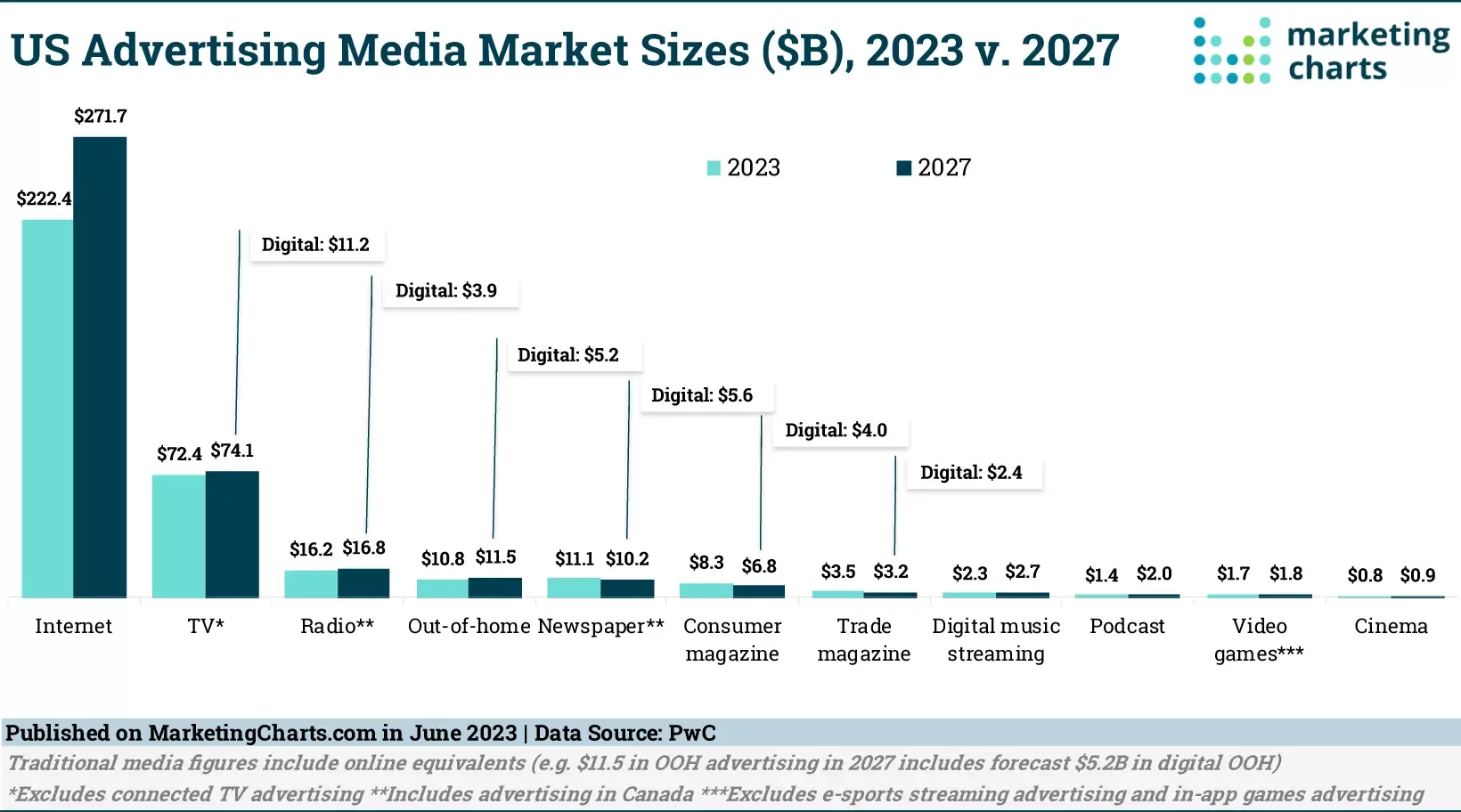Keeping up with digital trends is an endeavor—especially in an industry as ever-changing as healthcare. From legal restrictions and HIPAA limitations to market structure and changing consumer behavior, healthcare marketing can be a convoluted, challenging process. What works for one organization may not work for the next.
However, rather than compete, we often hear of healthcare organizations throwing in the towel by relying on outdated methods.
The reality is that digital marketing matters more than ever. In 2019, digital advertising spend in the U.S. officially exceeded traditional advertising spend for the first time. Digital marketing spending is only set to increase over the next few years.

Thanks to technological advancements—in both personal and medical technology—more emphasis has been placed on the patient experience. Consumers now have an unprecedented ability to research information and compare providers, which means a presence online is more important than ever.
Importance of Digital Marketing in the Healthcare Industry
Healthcare consumers demand choice, customization, and convenience. Modern patients want to see how medical practices adapt to their lives. So, if you don't have a digital healthcare marketing strategy for your practice, it may be time to reconsider. Let's explore a few ways you can reach prospective and current patients through digital marketing.
1) Target Your Patients with SEO
Digital marketing is a rare industry that allows businesses to track results in real time. Things such as ad copy, web page layout, and contact form placement influence how patients interact with your practice. Using the right data helps uncover what patients are most interested in—and how they go about searching for that information.
A refined SEO strategy can optimize your digital efforts around topics your audience is typing into search engine result pages. For example, an individual trying to find a cardiology practice may search for terms such as heart questions, cardiovascular health, and open heart surgery costs. If a patient is searching for “heart doctor near me”, you want to be the first to show up. Is your Google Business Profile set up and optimized to appear for prospective patients? That is one of many important SEO checks, especially for local practices.
SEO organizes websites so that patients can easily access information they want to read. Investing in SEO helps you create relevant pages that appear on search engine results for terms related to your patients’ search queries. By conducting keyword research and user experience analyses, it can inform the creation of website content, blog posts, social media campaigns, and ad copy—so that messaging is aligned across all marketing efforts, creating a unified answer to your future patient's specific healthcare needs and maximizing your investment in digital marketing.
2) Reach Patients at the Right Time with PPC
The way that people interact with healthcare facilities varies based on their needs. Did you know that 5% of Google searches are health-related? People may be proactively searching for a new primary care physician or they may be looking for an urgent care facility in a time of emergency. Others may be anxiously searching for prescription side effects or disease symptoms (hello, impromptu WebMD searches!).
Regardless, people are using search engines to look for specific solutions to a problem. And if you aren’t taking the time to understand what they’re looking for and meet them where they are looking, you’re missing out on potential new patients.
Improving your organization’s patient acquisition efforts means delivering streamlined communications across the right channels. Pay-per-click (PPC) advertising enables organizations to pay for targeted ads across a defined geographic location and specific channels. For example, an urgent care facility could invest in Google Ads to target a specific location—say, Urgent Care Center NYC—to entice patients to visit their facility.
PPC offers health systems immediate, consistent visibility—which serves as a foundation for awareness and new leads. Ultimately, paid advertising efforts ensure that local users can find your practice, no matter where they are in their healthcare journey.
3) The Patient Experience and Regulation
While it has always been an ethical concern for hospitals to provide a top-notch patient experience, the Centers for Medicare and Medicaid Services has made it a financial imperative as well. The HCAHPS survey is the first national, standardized survey to measure patient experience.
In addition to providing objective data about patient care, the survey is designed to incentivize healthcare systems to increase their focus on experience and engagement. In fact, HCAHPS results are directly linked to Medicare reimbursement and influence whether hospitals lose or gain payments.
While initiatives such as the HCAHPS survey qualify a hospital’s in-person experience, a patient’s journey begins well before they step foot in your facility. First impressions mean a lot in healthcare. And oftentimes, this begins when a new lead interacts with a piece of your digital content.
Digital marketing in healthcare sets the stage for the patient journey
It’s essential to establish expectations and create trust with your patients. This boils down to delivering on your promises. If you run social media display ads touting the cleanliness of your hospital, your waiting room should be spotless. And if you publish blog posts that push the professionalism of your staff, you should deliver a seamless experience—from your receptionists down to your doctors.
Ask yourself the following:
- How do I portray my organization to my patients?
- Is there a disconnect between my online presence and my in-house patient experience?
- Are members of my practice aligned on how they communicate our values across all patient touchpoints?
A digital marketing agency with years working in the healthcare space, such as Workshop Digital, can help you target the right audience in the right place, while still keeping up with HIPAA and other medical regulations.
Learn more about healthcare digital marketing
Healthcare digital marketing can reach new patients across numerous channels and keep current patients engaged with personalized outreach efforts. By investing in SEO and PPC strategies to reach a local audience, and creating relevant marketing messaging, your practice can increase its reach and cater to patients at the right time in their decision process. Contact us to get started today.
This blog post was originally published on March 1, 2019, and was updated and republished on February 28, 2024.

